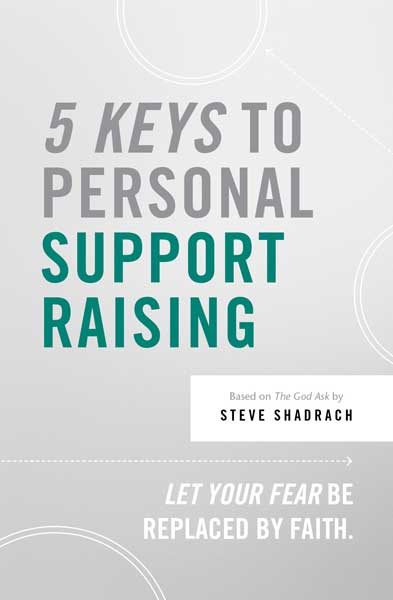In Jim Collins’ classic book “Good to Great” he says one of the keys to being a truly great organization is if the leaders are able to ask the really tough questions about the condition of their company. If they are willing to confront the “brutal facts,” especially about their own leadership, then they are on the path to finding healthy solutions. Personally, it’s not hard for me to slip into a passive posture, close my eyes, and just hope everything turns out ok. I do that under the guise of “trusting God” but in reality I think I struggle with procrastination, laziness, even denial.
Well, enough of my weaknesses. Let’s talk about yours! Do you desire to move your organization from “good” to “great”? Do you have enough trust built up with the rest of your leaders that you can talk openly and honestly about the plusses and minuses of your ministry? But what if some of the struggles are related to the way you lead? Your personality or character? Decisions (or non-decisions) you have made that possibly hurt more than helped? If so, will you still be as receptive and teachable? Remember, before we can get the speck out of another’s eye, we have to get the plank out of our own!
And if you’re anything like me, you consider yourself to be a fairly humble person. But in sensitive discussions like this, defensiveness (i.e. sin of pride) can rear its ugly head in our life, and we are usually the last ones to recognize it! So, before you pull your team together to do an audit of the support raising health of your organization, consider uttering this prayer to God from a sincere heart:
“Oh Lord, open my mind, my heart, my eyes. Help me to ask the tough questions. To listen. To try to understand. To take notes and affirm others rather than be formulating my responses. We trust you, Holy Spirit, to lead our discussion, to guide us to truth and to the needed changes we must make if we are going to be healthy. We desperately need you Jesus. We invite you to take charge of this meeting. Amen.”
On second thought, that might be a good prayer for you to offer in the presence of all the key players in this critical meeting. Hearing that will definitely set the tone you are looking for with your teammates.
Now, for this meeting, why not use a tried and true approach that most of your leaders should be familiar with? It’s the classic SWOT analysis evaluating the Strengths, Weaknesses, Opportunities, and Threats of your ministry. Have someone man the whiteboard utilizing “brainstorming ground rules” where there is no comment that is off limits. Everything gets written down on the board before any evaluations are begun!
SWOT analysis on the support raising “DNA” of your organization and staff.
As honestly as possible, answer these five questions:
1. What are the support raising STRENGTHS of your organization and staff?
Maybe you or your team feel good about:
- The levels of support of your staff
- Leadership modeling strong support raising
- The quality of your support training
- The accountability/follow through you are able to implement
- The ongoing coaching of your new and veteran staff
- The attitude and modeling you and the other leaders demonstrate
- Others?
2. What are the support raising WEAKNESSES of your organization and staff?
Maybe you or your team don’t feel good about:
- The levels of support of your staff
- Leadership not modeling personal support raising
- The quality of your support training
- The accountability/follow through you are able to implement
- The ongoing coaching of your new and veteran staff
- The attitude and modeling you and the other leaders demonstrate
- Others?
3. What OPPORTUNITIES do you and/or your organization have to develop a stronger support raising DNA?
Here are some suggestions:
- Allot more time and resources to training
- Develop a policies/procedures handbook
- Create stronger accountability/follow through
- Identify support coaches within the organization
- Change of paradigm from leadership
- Partnering with an outside training group
- Others?
4. What THREATS exist to you, the staff, or your organization to develop a stronger support raising DNA?
Here are some possibilities:
- Unsupportive leadership
- Board opposing your support raising philosophy or approach
- Losing key staff because of under funding
- Bad reputation with spouses, families, and churches because of underfunded staff
- Having to start paying (or subsidizing) certain staff salaries
- Others?
5. Based upon your SWOT, what specific action steps do you plan on taking?
When I teach young men how to study the Bible we try to zero in on real-life applications. In fact, we jokingly call our group “SPAMmers for Christ”. SPAM stands for Specific, Practical, Achievable, and Measurable. I don’t let them make applications like “I just want to be a better Christian” or “This week I am just going to love others more”. No, WHO will you show love to this week, HOW exactly will you do that, WHEN specifically will you carry out this act of kindness, etc…In fact, we back ourselves into the corner to make sure we have nowhere else to go but to apply (read: obey!) the Word of God in our daily life. So, Kurt is committing to wash/dry his roommate’s dirty clothes on Tuesday afternoon at 3:30 pm, fold them, and place them on his bed.
So, as a result of your SWOT, how will you SPAM? You and your team narrow down two or three specific/practical/achievable/measurable applications from your brainstorming and evaluation session—and then put them into practice.
Let me finish our time with some insights from Patrick Lencioni, author of The Advantage. This excellent author and consultant subtitles the book: Why Organizational Health Trumps Everything Else in Business. I have devoured this book and taken all of our leaders through it. Why? Well, Lencioni exposes me early on by listing the reasons we leaders struggle to truly embrace organizational health: Because we “quietly believe we are too sophisticated, too busy, or too analytical to bother with it. In other words, we think it is beneath us.”
Ouch!
If you and I are willing to set aside our pride for a bit and really dive deep into how we create (or recreate) a healthy support raising DNA in our ministry, I believe God will meet us there. Lencioni goes on to define what organizational health is: It is when an organization has “integrity—i.e. it is whole, consistent, and complete, that is, when its management, operations, strategy, and culture fit together and make sense.” If you and the other leaders of the ministry are willing to all agree that developing a vigorous support raising environment and practices are of utmost importance, you are moving toward true “integrity.”
Finally, he says, for organizations to remain healthy over time, their leaders must “establish a few critical, non-bureaucratic systems to reinforce clarity in every process, policy, and program. Every activity should be designed to remind staff what is really most important.” If you pay the price month after month to model and emphasize support raising health to your ministry, there will be tremendous dividends. Don’t take the short cut. Take the longer, harder route, knowing you truly care for your staff, and that implementing strong support raising accountability creates organizational health. And that trumps everything!


